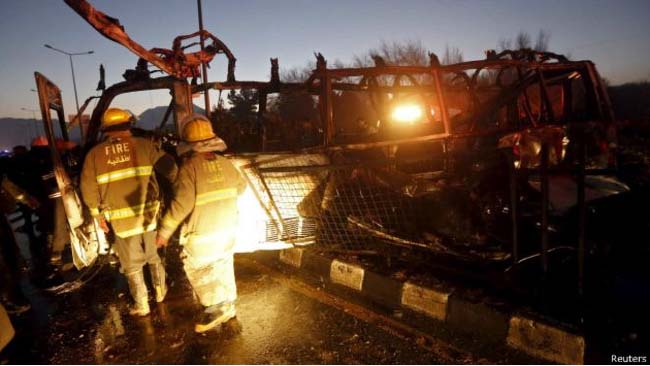The Wednesday attack on staffs’ vehicle of Moby group came as the first major militant attack selectively targeting media in Afghanistan. The attack shocked the nation and sparked condemnations from the international community. In reaction to the attack, President Ashraf Ghani called it an attack “not only on journalists, but on our constitution and exalted values”. The president said the freedom of expressions would be non-negotiable, referring to the peace talks with the militant groups. Taliban have claimed responsibility for the deadly attack which killed seven staffers and injured about 25 others. Condemning the Wednesday attack, the United Nations Security Council has demanded prosecution of the perpetrators, organizers and supporters of the attack. The international rights advocacy group Human Rights Watch said that the anti-government groups in Afghanistan should immediately stop their deliberate attacks on civilians.
The attack on staff members of the Moby media group came after the Taliban earlier accused two private TV channels of bias in reporting from the conflict in Kunduz province last year. The Taliban designated members of the two TV channels as their legitimate military target. Since the fall of the Taliban in 2001, the attack on Wednesday was the first in its scale against the media in Afghanistan. It was in fact a declaration of war against the free press in Afghanistan, something the Taliban had avoided to do before. Afghanistan is one of the most dangerous countries for journalists as dozens of journalists being killed by militant groups every year. The already precarious environment for Afghan journalists is now becoming particularly unsafe as the Taliban are threatening to deliberately target the journalists.
Designating media organizations as legitimate military targets is indicating a shift in Taliban approach to the freedom of expressions and the activities of the free press in Afghanistan. Pursuing more aggressive militant campaigns on the ground, the militants aim to further boost the group’s propaganda machine along with its military offensive. However, the free and independent press in the country is viewed by the militants as the biggest hurdle against their war propagandas. The Taliban have been pressurizing Afghan journalists to include the group’s media wing as the source of their reporting from of the situation and the casualties on the ground. This is while the Taliban media outlets are never reliable sources for news as they grossly exaggerate the events on the ground for Taliban victories.
The Wednesday attack in Kabul is going to be a major test for the free media in Afghanistan. The Taliban have been responsible for a large part of the casualties of the Afghan journalists. However, the group officially was trying to avoid deliberately targeting media members and journalists. By targeting media men and journalists the Taliban are terrorizing the free press in Afghanistan. This is going to be a major setback for the free press in the country. In last fifteen years of the conflict, hundreds of journalists have been killed or injured as result of their activities. But it is the first time the Taliban are starting to wage an official and broader war against the media in Afghanistan.
The Taliban and other like-minded groups should be taken accountable by the international community and the major world bodies such as the United Nations over their obligations to the safety and security of the media members. The United Nations should designate such attacks on media as war crimes.
The Taliban must remain committed to safety of journalists providing news of the conflict across the country. Protecting media members is a basic obligation of all parties in the conflicts, and all sides including the militant groups must protect journalists. Most of the civilian casualties in the past fifteen years of the conflict have been attributed to the militant groups. The Taliban must end deliberately targeting the civilian population including members of the media. The UN should remain engaged in talks with the Taliban and other militant groups over protection of the civilians. Targeting civilians and media members is a gross violation of the Taliban’s official policy as well as their war obligations.
The government needs to do more to safeguard freedom of expression and protect media members reporting the war. Another round of peace negotiations is expected to get underway in a near future after the recent quadrilateral coordination meetings in Kabul and Islamabad.
The government and other members of the quadrilateral coordination group should raise safety of the civilian and the media members as a key issue of talks in the negotiations. The government and other countries involved in the process should exert pressures over the Taliban to ensure the safety of civilian and journalists. As Ashraf Ghani stressed on the wake of the attack, the government need to protect freedom of expressions as a non-negotiable universal value enshrined in the Afghan constitution. As the militants are not tolerating free speech and freedom of expressions in the country, they will raise the matter for negotiations in the peace process. But it is the obligation of the Afghan government to protect the hard-gained achievements of the past fifteen years.
As the upcoming Taliban seasonal campaign is looming, Taliban would probably further step up targeting members of the media in Afghanistan.
The current environment would further deteriorate for the free press in Afghanistan with the deteriorating armed conflict in the country. Civil and media organizations need to step up campaigns for safety and security of journalists and other media members along with more concerted efforts for promoting freedom of expression. These organizations should do more in reaching out to the international community and world bodies for safety and security of journalists in Afghanistan.
Home » Opinion » Targeting Free Press in Afghanistan
Targeting Free Press in Afghanistan
| Abdul Ahad Bahrami

